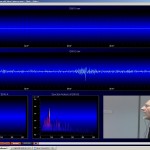‘Testamentary Capacity in Dementia’ (03 June 2013 10:00h – 13:00h) – Presentation followed by in-depth plenary session about the complexities of leaving an estate to beneficiaries following a diagnosis of dementia.
‘Dementia’ is an umbrella term used to describe many types of deteriorating diseases – the most common ones are Alzhiemer’s disease, Vascular dementia, and Lewy body dementia.
Many married couples own property as ‘joint tenants’. Upon death, ownership automatically passes to the survivor. If property is owned as ‘tenants in common’, one half of the estate belonging to the deceased is dealt with by their Will. Problems arise when there is no Will, when others make a claim, or when another Will is executed.
‘Testamentary capacity’ is a person’s legal and mental ability to make a
valid Will. There are three premises: Presumption of capacity; Requirements; Proof of testamentary capacity.
It is proposed that the law should allow testators alternative means of satisfying the testamentary capacity standard such as an option to validate a testator’s capacity during their lifetime through forensic assessment measuring cognitive elements of testamentary capacity.
It does not remove the difficulty of knowing the status of person at a specific time line. However, it goes some way to describing a person during their lifetime in terms of mental ability and capacity.
Thompson, SBN (2006). Dementia and memory: a handbook for students and professionals. Aldershot: Ashgate.
Thompson, SBN (2012). Dementia. In SBN Thompson (Ed), Psychology of trauma: clinical reviews, case histories, research (pp169-202). Portsmouth: Blackwell-Harvard-Academic.
 Capturing a yawn: initial observations – Dr Simon Thompson
Capturing a yawn: initial observations – Dr Simon Thompson










 Nursing Research REF Impact in Nepal
Nursing Research REF Impact in Nepal Fourth INRC Symposium: From Clinical Applications to Neuro-Inspired Computation
Fourth INRC Symposium: From Clinical Applications to Neuro-Inspired Computation ESRC Festival of Social Science 2025 – Reflecting back and looking ahead to 2026
ESRC Festival of Social Science 2025 – Reflecting back and looking ahead to 2026 3C Event: Research Culture, Community & Cookies – Tuesday 13 January 10-11am
3C Event: Research Culture, Community & Cookies – Tuesday 13 January 10-11am Dr. Chloe Casey on Sky News
Dr. Chloe Casey on Sky News ECR Funding Open Call: Research Culture & Community Grant – Application Deadline Friday 12 December
ECR Funding Open Call: Research Culture & Community Grant – Application Deadline Friday 12 December MSCA Postdoctoral Fellowships 2025 Call
MSCA Postdoctoral Fellowships 2025 Call ERC Advanced Grant 2025 Webinar
ERC Advanced Grant 2025 Webinar Horizon Europe Work Programme 2025 Published
Horizon Europe Work Programme 2025 Published Update on UKRO services
Update on UKRO services European research project exploring use of ‘virtual twins’ to better manage metabolic associated fatty liver disease
European research project exploring use of ‘virtual twins’ to better manage metabolic associated fatty liver disease